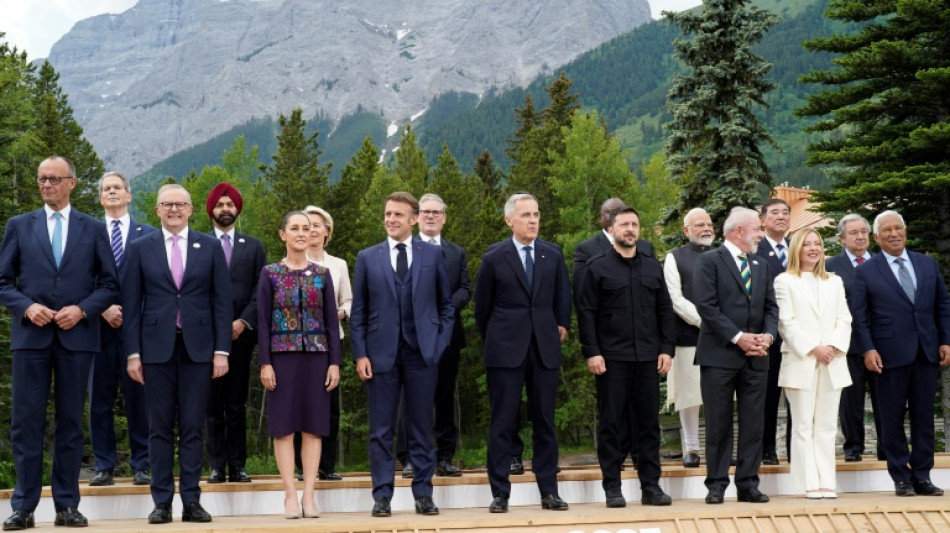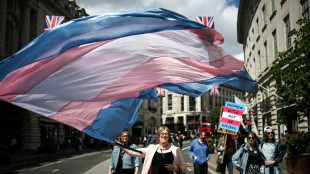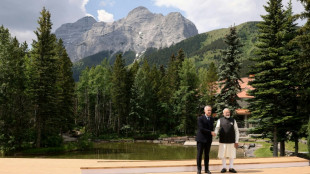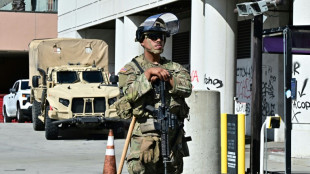

G7 minus Trump rallies behind Ukraine as US blocks statement
Group of Seven leaders minus President Donald Trump on Tuesday vowed greater support for Ukraine, as the United States blocked a joint call to pressure Russia, which is ramping up attacks on its neighbor.
The US president had been due to meet at the G7 summit in Canada with his Ukrainian counterpart Volodymyr Zelensky, with whom he has had a volatile relationship, but flew back to Monday over the Israel-Iran conflict.
Zelensky met the other leaders at a remote lodge in the Canadian Rockies hours after Russia hit Kyiv with one of the worst bombardments since it invaded in February 2022, killing at least 10 people in the capital.
Canadian Prime Minister Mark Carney welcomed Zelensky and announced Can$2 billion ($1.47bn) of military support, including drones and helicopters, for Ukraine.
"This underscores the importance of standing in total solidarity with Ukraine," Carney told him, calling for "maximum pressure against Russia."
But the Group of Seven summit was unable to issue a joint statement on Ukraine as "the Americans wanted to water it down," a Canadian official said on condition of anonymity.
The United States objected to language condemning Russia, saying it wanted to preserve its role as a mediator with President Vladimir Putin, the official said.
"That is not the position that we take, and the other six countries who have also agreed to put strong language in that declaration," she said.
Carney will instead put out a statement on Ukraine as chair of the summit rather than from all the leaders, the official said.
In Washington, the State Department separately condemned the Russian strikes and offered condolences to the victims' families.
- US waits on pressure -
Carney also joined Britain in tightening sanctions on Russia's so-called shadow fleet of ships used to circumvent international sanctions on its oil sales.
"These sanctions strike right at the heart of Putin's war machine, choking off his ability to continue his barbaric war in Ukraine," Prime Minister Keir Starmer said in a statement.
US lawmakers have drafted a package of new sanctions on Russia but Trump has been hesitant to give his support, saying he wants to preserve relations with Putin, whom he spoke to by telephone on the eve of the G7 summit.
Trump infamously berated Zelensky in the Oval Office on February 28, saying he was ungrateful for US aid, but has since voiced disappointment that Putin has rebuffed a US proposal for at least a temporary ceasefire.
Zelensky, his voice choked with emotion, told Carney that the latest Russian attack was a "big tragedy" and it showed the need for allies' support -- and made clear that he still backed Trump-led calls for negotiations.
"It's important for our soldiers to be strong in the battlefield, to stay strong until Russia will be ready for the peace negotiations," Zelensky said.
"We are ready for the peace negotiation -- unconditional ceasefire. For this we need pressure."
French President Emmanuel Macron accused his Russian counterpart of exploiting global focus on the Middle East to carry out the deadly attack.
"It shows the complete cynicism of President Putin," Macron told reporters at the summit.
- Tough trade talks -
The G7 -- Britain, Canada, France, Germany, Italy, Japan and the United States -- was holding its first summit since the return to power of Trump, who openly questions longstanding US alliances.
Treasury Secretary Scott Bessent remained to represent the United States at the summit, where discussions have also concentrated on Trump's attempts to radically overhaul the world's trading system.
Trump has vowed to slap sweeping tariffs on friends and foes alike on July 9, although he has postponed them once.
The US president, speaking to reporters on his way back from the summit, complained that the European Union was not yet offering a "fair deal" on trade.
"We're either going to make a good deal or they'll just pay whatever we say they will pay," he said.
European Commission president Ursula von der Leyen said she still hoped for a negotiated solution and that talks were "intense and demanding."
Trump's negotiators have already sealed a deal with Britain and, outside of the G7, reached an agreement to lower tariffs with rival China.
Japanese Prime Minister Shigeru Ishiba said he had "frank" discussions with Trump on Monday but made clear the importance of automobile exports to the world's second-largest developed economy.
D.Richter--MP




